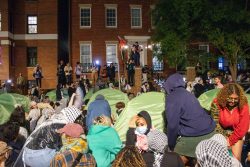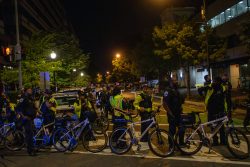An estimated 70 percent of sexual assaults on college campuses went unreported last year, according to Sexual Assault Coordinator Shannon Hunnicutt. A new Sexual Assault and Relationship Violence Advisory Council wants to change that. Providing training to Resident Assistants and Department of Public Safety officers to deal with sexual assault victims, student representative Mary Nagle (CAS ‘05) said, will ensure that “no one will fall through the cracks.”
At the council’s first meeting last week, students, members of several University departments and representatives from local resource centers came together to discuss the lack of coordination within Georgetown’s sexual assault response system. The council’s projects are being funded by a grant issued in January by the D.C. Justice Grants Administration.
According to Hunnicutt, the biggest obstacle to helping sexual assault victims is the low reporting rate. “If we could get students to report, but not necessarily to prosecute, I would consider that a victory,” said Nagle.
Hunnicutt said that when students do report, they tell someone they trust. This can be anyone from a DPS officer to a friend or professor, she said. She hopes to create communication between those most commonly sought: RAs, DPS officers and Health Education Services.
Hunnicutt emphasized, however, that this council will not address the adjudication process. She said that the grant is specifically intended for law enforcement issues and will be used only to improve the response system.
Hunnicutt noted that the resources for sexual assault victims have always existed. “These services aren’t new, these aren’t things Georgetown is lacking,” she said. “But I think students are not knowledgeable about the services we provide.”
Laura Kovach, a representative of My Sister’s Place, a local battered women’s shelter, confirmed that Georgetown’s response system is impressive. “I was pretty excited to see the training that sexual assault advocates get,” she said.
Nevertheless, cooperation between the various departments could greatly improve students’ experience with reporting, Hunnicutt said. She envisions a wheel-like system, with victim’s advocates at the center.
In the past month, she has created a team of trained advocates who are on-call 24 hours a day. Now, she hopes to design a protocol by which students will be referred to the victim’s advocates, no matter where they enter the system.
By the end of the year, the group hopes to train all RAs and DPS officers. “The goals of the grant are fairly specific, and I’m sure that we’ll be successful,” Hunnicutt said.
“It’s a pretty daunting task, but I think we’ll be successful,” Henle Village Area Coordinator Christie Anthony agreed.
All noted the importance of student feedback via either a survey they plan to set up on the health education website be.georgetown.edu, or via direct communication with Hunnicutt. “We can create this program, but if it’s not what students want it’s not going to be very successful,” Hunnicutt said.




